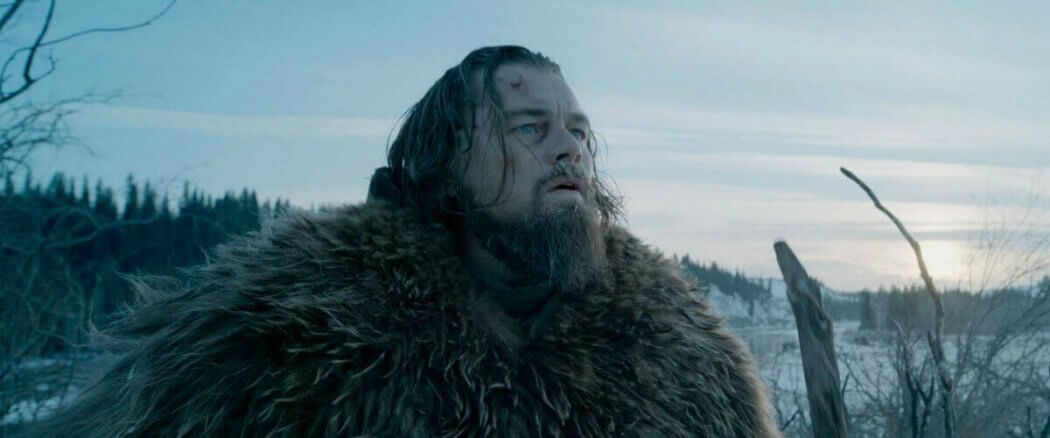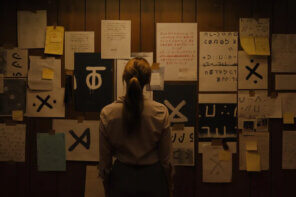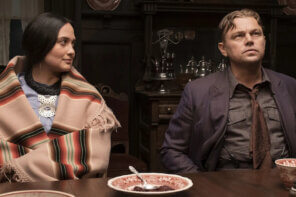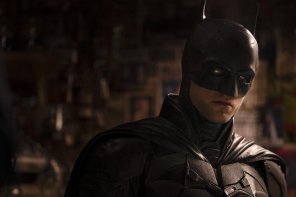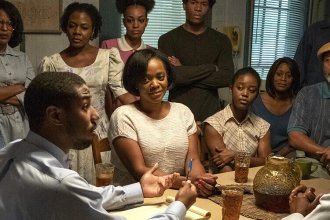Let’s just get this out of the way: DiCaprio is magnificent in The Revenant. Give him an Oscar. It’s a part that requires a passion very few other actors possess, or at least are capable of revealing.
Then again, I did say “very few.” That’s because it wouldn’t take much to see Daniel Day Lewis here (and before you jump to some sort of silly response like, “DDL could do anything!” I’ll remind you of this). There’s a short list of actors who could pull off a performance like DiCaprio’s, but it is a list, and one person on the list happens to share the screen with him. That list includes, but is not limited to Denzel, Cumberbatch, Hardy, Pacino and Deniro (before they were abducted and replaced by aliens who do bad comedies), DDL…I could maybe even see Del Toro in on this.
The genius in The Revenant isn’t DiCaprio. There’s no list of people who could have done what Emmanuel Lubezki did in this film, and his incredible three-picture stretch of Gravity, Birdman, and The Revenant cements him as one of the greatest cinematographers ever.
Oh, did I mention he was also cinematographer for Children of Men, A Walk In The Clouds, A Little Princess, Y Tu Mamá También, and here’s one I always thought looked incredible – Meet Joe Black? Yeah, same guy. The list is longer, and just shows his gifts, but if you had any of these films on your IMDb, you’re feeling pretty good about your career.
Impossible Shots
In The Revenant, Lubezki chose to shoot using only natural light – intentionally limiting his palette and exposing his genius. The resulting 156 minutes is an arthouse film which uses light and dark, lyrical movements of trees and plants, forces of nature like animals and waterfalls, cinematic fury of fire at night and buffaloes on a plain.
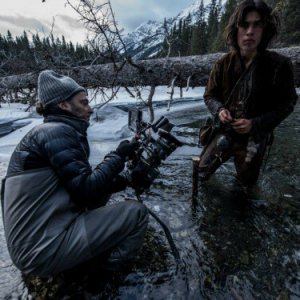 Shooting a massive feature with only natural light means months of painstaking attention to the details of your terrain and environment, hour after hour choreographing and blocking shots, a familiarity with your lens and camera like it’s a limb on your body. Stop trying to figure out how he did it, because if you did, you still couldn’t do it. If I gave 1,000 DPs a blockbuster budget and an Arri Alexa 65, none would be capable of what Chivo did in The Revenant.
Shooting a massive feature with only natural light means months of painstaking attention to the details of your terrain and environment, hour after hour choreographing and blocking shots, a familiarity with your lens and camera like it’s a limb on your body. Stop trying to figure out how he did it, because if you did, you still couldn’t do it. If I gave 1,000 DPs a blockbuster budget and an Arri Alexa 65, none would be capable of what Chivo did in The Revenant.
Add to the film the haunting, poignant music from Carsten Nicolai and Ryuchi Sakamoto, the forceful oh-the-humanity performance of Tom Hardy, Iñárritu’s bold direction and writing (with Mark L. Smith)…and this is greatness. Fierce greatness, like Tom Brady where you don’t necessarily have to like it as much as know it’s great.
Back From the Grave
Loosely based on a collection of stories and legends told about Hugh Glass and by Glass himself, The Revenant is set in the wilderness of 1820s America. DiCaprio plays Glass, a scout who is hired to lead a group of pelt-gatherers on an expedition. Glass and his teenage son Hawk (played by Forrest Goodluck) are away from camp when their group suffers a lethal attack from Arikara Native Americans.
A handful of men survive, and Glass devises a plan that will chart a new path through the wilderness to a nearby U.S. fort. A massive bear attacks Glass, leaving him horribly wounded. His expedition team nobly tries to forge on with him, but traversing the terrain with a dying man on a stretcher becomes more and more difficult.
The group decides to leave Glass – in what appears to be his dying last hours – in the care of John Fitzgerald (played exquisitely by the inimitable Tom Hardy), Hawk and another member of the team. Fitzgerald sees an opportunity, kills Hawk in front of Glass, then leaves him buried alive in a shallow grave.
And that’s pretty much the opening of the film.
From there, we’re crawling across wintry dirt with Glass, limping with him up mountains, plunged into icy waters as we careen down waterfalls, gagging with him as he eats some raw animal parts – all as Glass slowly follows Fitzgerald to seek revenge.
The Heart of Darkness
The film fights you. I was exhausted at the end, much like I was at the end of Gravity, although I smiled at the end of Gravity. I think you have to let all the body blows this film lands on you heal a bit before you can genuinely react. Iñárritu turns us all into Hugh Glass.
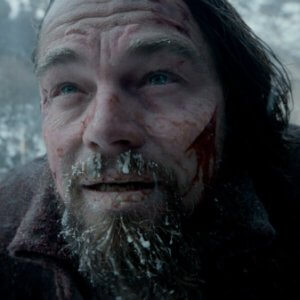 Iñárritu’s slow but steady pace to the inevitable feels much like Coppola’s journey into The Heart of Darkness in Apocalypse Now. We move slowly so we can, bit by bit, experience the darkness of humanity and all that lures, tempts, and ultimately finishes us: revenge, lust, greed, anger, fear. Like Apocalypse Now, our protagonist is on a lethal, if not evil mission himself, but we cheer for him.
Iñárritu’s slow but steady pace to the inevitable feels much like Coppola’s journey into The Heart of Darkness in Apocalypse Now. We move slowly so we can, bit by bit, experience the darkness of humanity and all that lures, tempts, and ultimately finishes us: revenge, lust, greed, anger, fear. Like Apocalypse Now, our protagonist is on a lethal, if not evil mission himself, but we cheer for him.
*It might be noted that both productions seemed to face defections, delays, rumors of mutiny and ultimately, greatness. Hearts of Darkness was a great documentary, and if one is ever assembled of the production for The Revenant, I’m confident it will be just as riveting.
The Revenant takes our evil seriously, and shows how empty its “victories” leave us. When left to ourselves, whether we are Arikara, French, American, we find, as Iñárritu himself cited, “There’s a Chinese poem or saying that says, once you start the journey of revenge, start digging two graves: one for you and one for the enemy. Because it’s true. Nobody will win.”
Good and Evil
In The Revenant, Iñárritu is intent on showing us that what moved Glass to crawl, limp, and stumble across 200 miles of wilderness, to stave off certain death – was the purest thought of the greatest love he’d ever known. What motivated Fitzgerald was his own purest thought of living freely in the greatest place he could imagine.
Then again, all the greatest sins start with beautiful images:
- “For God knows that when you eat from it your eyes will be opened, and you will be like God, knowing Good and Evil.”
- “Now when evening came David arose from his bed and walked around on the roof of the king’s house, and from the roof he saw a woman bathing; and the woman was very beautiful in appearance.”
We want to believe there’s more Glass than Fitzgerald in us, but there may not be much difference between the two men. We need more than this world’s got to offer, or we will surely end up destroying each other. This isn’t a film about race, or greed or vengeance, but about how evil has beset both man and nature, and the shards of beauty that remain to remind us there is something more.

